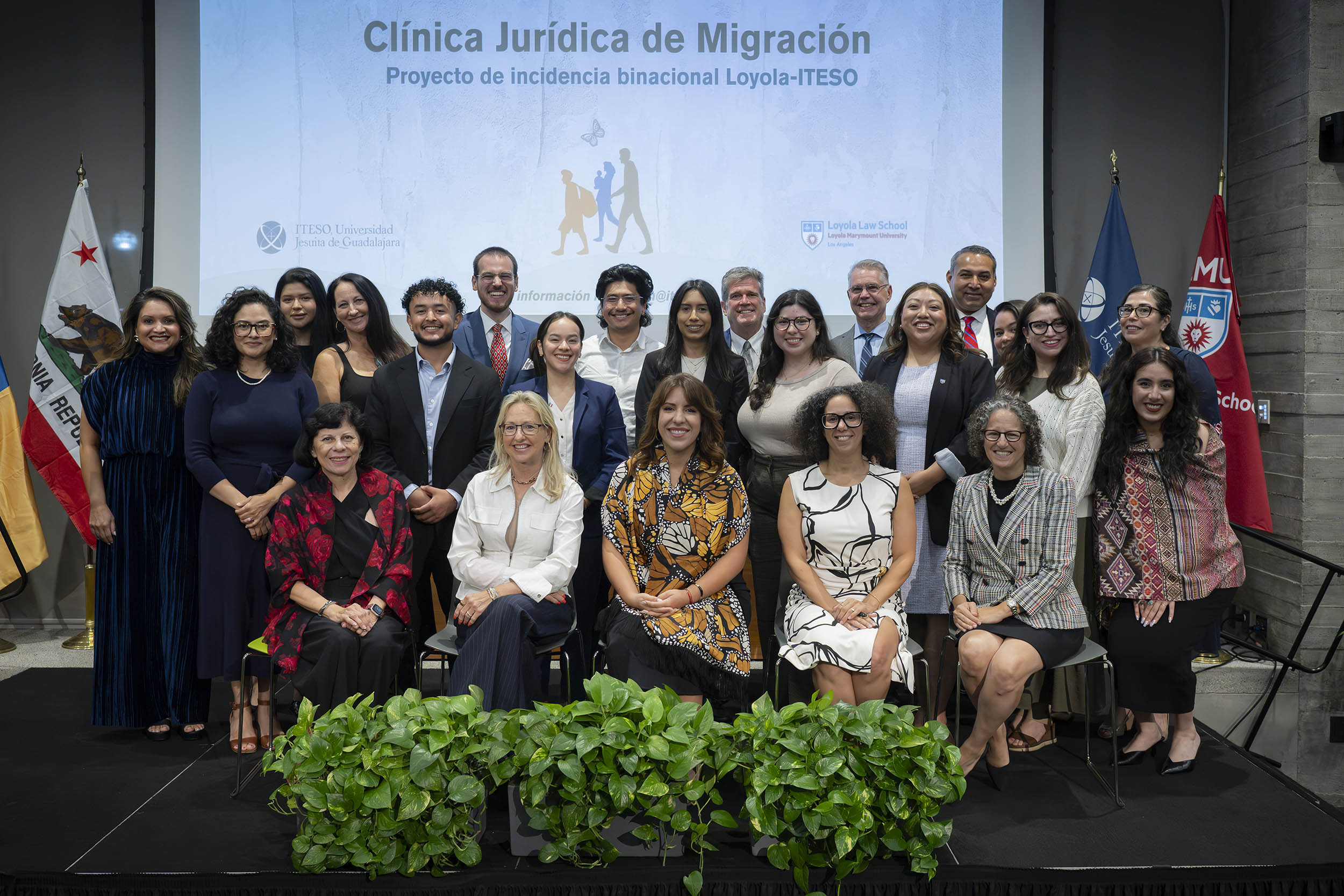Hundreds of global educational, legal, and religious dignitaries and advocates gathered in Mexico earlier this semester for the formal launch of the Binational Migrant Advocacy Project (BMAP), a partnership between the Loyola Immigrant Justice Clinic at LMU Loyola Law School and ITESO, Universidad Jesuita de Guadalajara, in a multiday series of events that some likened to a marriage.
“I think the wedding metaphor is perfect. I know that Loyola Law School and ITESO have collaborated for more than seven years on various immigration service projects. And this was already such a strong institutional partnership, so I guess that’s the courtship,” said Dean Brietta R. Clark in her opening remarks during the Sept. 2 formal inauguration ceremony. “But today we formally declare our shared commitment. We celebrate the joining and enlarging of our two families through this deep and special bond that is the Binational Migrant Advocacy Project.”
Later in the ceremony, LIJC Director H. Marissa Montes ’12 explained the genesis of the courtship. “We started noticing the increased connection between Guadalajara and L.A., which has the highest number of Mexican nationals out of Mexico, most coming from the state of Jalisco. So, of those who have been deported or who have returned here in Jalisco, the majority are former L.A. residents or lived in Southern California,” she said. “As we started doing this work, it was very obvious there was a strong connection between our two cities, and it was very important for us to do this work.”
Alignment was a central theme throughout the Aug. 31-Sept. 3 series of events, which included an immigration services roundtable, a benediction of the new center’s offices, and a 20th anniversary celebration of the award-winning documentary “Voces Inocentes,” with a screening featuring director Luis Mandoki and screenwriter Oscar Torres. The series was designed to underscore the importance of cross-border collaboration at a time of heightened immigration challenges in the U.S., bringing together students, faculty, partners, and community leaders for a weekend of celebration, dialogue, and action.
“I’m incredibly proud to say that this is the first binational clinic that exists between a Mexican and U.S. law school,” said Montes. “This project is incredibly timely. As U.S. policies move beyond our physical order, we as advocates have to not only provide services to the migrant communities in both the U.S. and Mexico but really train future advocates.”
Key support for the project came from Alicia Miñana and Rob Lovelace. For the past 30 years, Miñana has worked as an L.A. attorney, dedicating her time and resources to supporting philanthropic efforts focused on human rights issues. The gift from Miñana and Lovelace of $300,000 extends their longtime impact on training emerging advocates and championing the needs of migrant communities. The Kebok Foundation also supplied critical support.
“Without Alicia Miñana and Rob Lovelace, and the Kebok Foundation, there would be no BMAP,” said Dean Clark. “We are so thrilled these amazing benefactors were represented during our inaugural festivities.”
A constant presence throughout the celebrations: The Jesuit approach to creating attorneys for others that strengthens the partnership. “ITESO and LMU have long shared a common mission: To advance academic excellence that demands engagement with the world, to use knowledge and creativity to address our most immediate and serious challenges, and to do this with a concern for those who are most vulnerable among us – equipping our students, our future leaders, with the tools they need to promote justice and have a meaningful impact.”
The LIJC is the first community-based immigration clinic housed at a U.S. law school. Through BMAP, LIJC deepens its commitment to serving migrant communities while also enhancing global legal education. Among the more than 11,650 individuals LIJC has served since its inception in 2012, LIJC advocates have helped 2,700 immigrants to naturalize, have represented more than 430 noncitizens in gaining humanitarian immigration relief such as asylum, SIJS, and visas for immigrant victims of violent crime including human trafficking, and have assisted 1,200-plus DACA recipients. Along the way, LIJC has trained more than 100 law students in immigrant advocacy, engaging students in policy advocacy and community education projects relating to legal issues faced by their clients.
